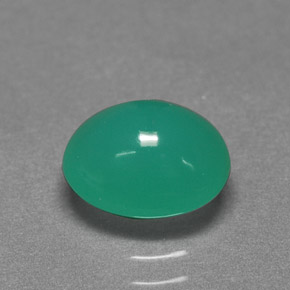The Gemstone Chrysoprase

Chrysoprase is the green variety of Chalcedony. Its color ranges from a light, minty-green to a deep apple-green. The unique, rich color of Chrysoprase is caused by impurities of nickel, as this gemstone most frequently originates in nickel-rich Serpentine deposits.
Chemical Formula
?
SiO
2 (with a high level of nickel
impurities)
Mineral Class
?
Quartz (
Chalcedony)
All About
The color of Chrysoprase can be lighter to more intense apple-green, though deeper colors are more desirable. Once the color reaches a dark threshold, the gemstone is no longer identified as Chrysoprase, but rather as a variety of
Chalcedony known as
Prase. Lighter-colored Chrysoprase is a much more popular gemstone material over dark green Prase.
The transparency of Chrysoprase ranges from
translucent to nearly opaque. A universal color consistency increases the desirability and value of this gemstone. The color of Chrysoprase may occasionally fade in prolonged light exposure, so care should be taken to keep these gemstones away from repeated exposure to strong lighting or sunlight. Chrysoprase is very similar to
Chrome Chalcedony, which is a green variety of Chalcedony colored green by chromium
impurities. Chrysoprase is usually a lighter shade of green compared to Chrome Chalcedony.
Uses
?
Chrysoprase is used as a minor gemstone and is cut into cabochons, usually round or oval, for use as pendants and rings.
Treatments & Enhancements
?
Although much of the Chysoprase available is natural, white
Chalcedony can be easily dyed to look like Chrysoprase.
Chrysoprase Sources
?
Important deposits of Chrysoprase are Australia, Tanzania, Madagascar, India, Kazakhstan, and the United States (Arizona and California). Poland was an ancient source of Chrysoprase, as well as the only source of this material for hundreds of years, until the newer deposits were discovered in modern times.
Similar Gemstones
?
Jade is softer and usually less
translucent, and
Prehnite is not as intensely colored and will usually have a more yellowish hue.
Turquoise is bluer in color with distinct color veining.
Variscite can appear similar, though it is usually more
waxy and is much softer.
Chrysoprase in the Rough Photos
?